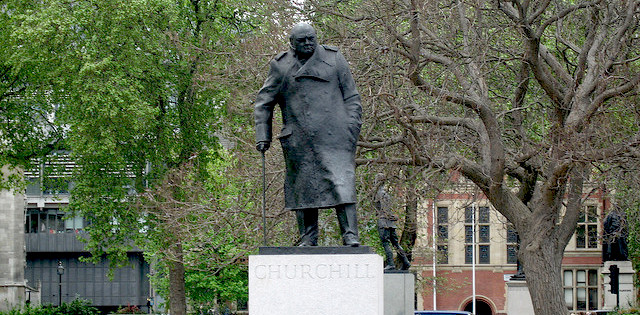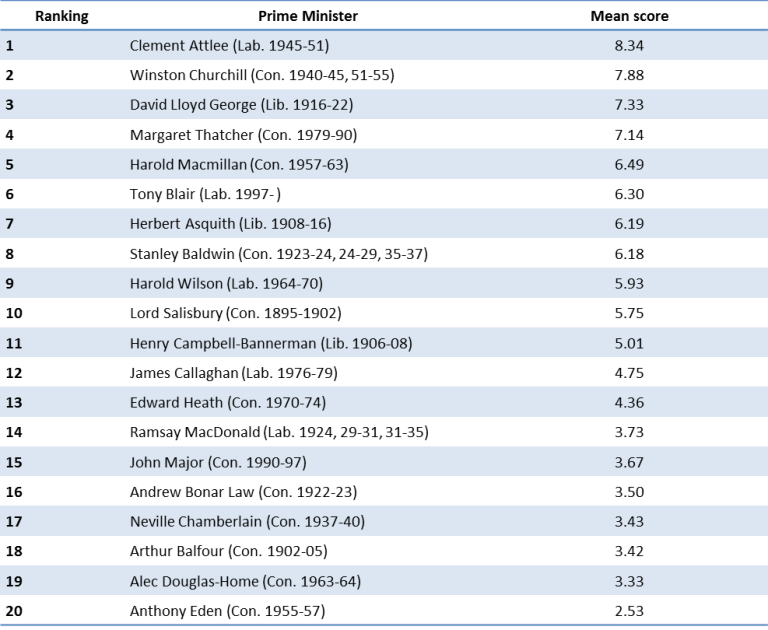Charismatic and power-driven Prime Ministers are perceived as the most effective by voters
The field of political psychology has demonstrated that there are quantifiable psychological traits that impact the perceived efficacy of political leaders in the US, Russia and specific case studies of individual British Prime Ministers. In a recent study, Sam Rohrer drew on this literature to analyse psychological traits linked to great leadership for 20th century British Prime Ministers, and finds that self-confident, decisive and charismatic leaders are looked upon most fondly by history.

A charismatic and power driven PM? (Credit: Charles Mok, CC BY-NC-ND 2.0)
Why are some heads of state remembered as ‘great’ leaders, and others are recalled simply as adequate, or occasionally even forgotten? The waxing and waning of the economy, or a states success or failure in a militarised dispute, can impact the perceived efficacy of political leaders. However, while these events play a substantive role in assessing effective leadership these events are not the whole story. The field of political psychology has demonstrated that there are unique, quantifiable, psychological traits that impact the perceived efficacy of political leaders. This field of research has provided insights into the traits of U.S. Presidents, U.S. presidential candidates, members of the Soviet Politburo, Russian presidential candidates, and a wide array of additional political figures including case studies of individual British Prime Ministers. However, a topic that has remained understudied is what psychological traits are linked to great leadership for British Prime Ministers spanning the the 20th century?
Why the dearth of research to date?
In recent years the greatness of PMs has been an increasingly common topic of debate in the media. The Guardian organised a poll of fifty historians, political scientists, and other social scientists in 1991 to rank the greatness of nine post-war PMs. In 1999, BBC Radio 4 conducted a poll of twenty historians, politicians, and commentators in order to rank British PMs from Lord Salisbury to John Major. In 2000, the British Politics Group conducted a similar poll that attracted a turnout of just22 responses. However, British historians and political scientists have expressed a greater sense of caution in regularly assessing the perceived greatness or effectiveness of British prime ministers than have their counterparts in American academia, cautioning against the hubris and political ‘parlor games’. A side effect of this caution has been a relative dearth of robust rankings assessing the effectiveness of British PMs. The largest and most systematic attempt at ranking the effectiveness of British PMs occurred in 2004 with the MORI/University of Leeds survey of 139 British political scientists and historians.

Source: Ipsos MORI/Leeds *The MORI/University of Leeds Survey was conducted in 2004. Therefore, Tony Blair’s full term as Prime Minister was not analysed
The impact of psychological traits on the perceived ranking British PMs
In an article published in Research & Politics , I examined the impact of remotely assessed psychological traits on the perceived ranking British PMs who came to power during the 20th Century. The traits were measured by drawing on transcripts of Parliamentary debates from the Hansard Archives. The verbal samples consisted of answers to policy questions and rebuttals to a previous statement that were greater than 100 words in length. These criteria increase the likelihood that the subjects were exposed to moderate stress. This requirement helps to meet the requirements that the verbal samples are relatively spontaneous answers of sufficient length that personality-driven word selections occur. Ceremonial and procedural statements in the House of Commons records were excluded from the samples. Verbal samples were collected until a total of 5,000 to 7,000 words were available for each year that a PM was in office. The samples were analysed using the Leadership Trait Analysis (LTA) coding scheme and Profiler+ automated content analysis software. Automated coding was chosen due to the high level of consistency that it provides, reducing the potential that unintended personal opinions, or partisan sympathies, affect the scoring of the material. In addition to these measures controls were included for economic conditions and militarised disputes to ensure that these events were not impacting the perceived efficacy of PMs.
Three primary LTA traits were examined via OLS regression in this project. The first was a politicians’ ‘need for power.’ This measure indicates an individuals concern for establishing authority, control, and/or influence over another person or group. High scores in this category have been linked to charismatic leadership and an increased likelihood that the public perceives a leader as effective, or ‘great’. Without a high power motivation leaders are unlikely to develop persuasive skills to influence others, or enjoy a position of authority. The second trait is a leader’s ‘belief in one’s ability to control events.’ This LTA measure focuses on the leader’s perception of having some degree of control over situations in which they find themselves—specifically, it assesses the belief that individuals and governments can influence outcomes. Previous research into the effectiveness of political leaders suggests that strong power scores are linked to decisive action. However, in addition to power, this finding may be in part explained by the belief that one can control events. The third trait focused on in this study measures a subjects, ‘conceptual complexity’ or openness to new and nuanced information. In a study of U.S. Presidents’ openness to new information positively correlated with being considered an effective leader. In addition to the LTA variables controls were included for economic growth/decline, months of a PM’s tenure at war, and party identification.
Results
Existing literature on the effectiveness of political office holders has focused strongly on the American presidency without examining how its findings might be applied to leaders
across varying political structures. This project identifies that across the 20th century, leaders who have projected strong power motivation are significantly more likely to be considered effective leaders. This finding aligns with previous work conducted by Hermann and House, to name a few, indicating that self-confident, decisive, and charismatic leaders are looked upon fondly by history regardless of the political system they operate in. Given the unique role of the PM as first among peers, the conceptual complexity results were surprising. The more open a PM is to new information, or nuanced information, the more likely that they will be viewed as ineffective. In assessing 20th century PMs, charisma and decisiveness therefore trump leadership that is willing to view the world in various shades of gray.
Conclusion
In summary, psychological traits as measured by the LTA coding scheme have a significant impact on the perception of effectiveness/greatness of British prime ministers spanning the 20th and early 21st centuries. In addition to providing historical insight into what has made a great prime minister in the past, this project offers potential political applications. Determining traits associated with ‘great’ leadership over a century can provide suggestions which can strategically influence the political campaign messages and debating strategies for future prime ministers in the UK, and perhaps similar parliamentary structures across the globe.
First, political campaigns could utilise automated text analysis to measure a political candidate’s or spokesperson’s LTA scores. In doing so, the campaign could determine if psychological traits commonly associated with effective or great leadership are inherently present in individuals delivering a political message. Second, in a head-to-head debate, such as future prime ministerial debates in the United Kingdom, stressing an opponent’s behavior associated with low need for power scores or high conceptual complexity scores would emphasise psychological traits which are significantly associated with ineffective leadership in the United Kingdom. If these traits were targeted successfully, it could create the impression that opponent X would make an ineffective national leader if his/her party were to win the election.
—
Note: this post represents the views of the author, and not those of Democratic Audit or the LSE. Please read our comments policy before posting.
—
 Sam Rohrer is an Assistant Professor at the University of North Georgia – The Military College of Georgia. His research centres on political psychology and effective leadership, as well as economic drivers of terrorism and maritime crime.
Sam Rohrer is an Assistant Professor at the University of North Georgia – The Military College of Georgia. His research centres on political psychology and effective leadership, as well as economic drivers of terrorism and maritime crime.





 Democratic Audit's core funding is provided by the Joseph Rowntree Charitable Trust. Additional funding is provided by the London School of Economics.
Democratic Audit's core funding is provided by the Joseph Rowntree Charitable Trust. Additional funding is provided by the London School of Economics.
Charismatic and power-driven Prime Ministers are ‘perceived’ as the most effective by voters https://t.co/3us9skPoh9
Check out my post on LSE’s @democraticaudit site. https://t.co/OQGXPIwDLc
“quantifiable psychological traits that impact the perceived efficacy of political leaders” https://t.co/3iZEYmTtuJ
Charismatic and power-driven Prime Ministers are perceived as the most effective by voters: https://t.co/SLSovjssYt
Charismatic and power-driven Prime Ministers are perceived as the most … – Democratic Audit UK https://t.co/39aMFN83FA
Charismatic and power-driven Prime Ministers are perceived as the most effective by voters https://t.co/H5sCRawZ2T
Charismatic and power-driven Prime Ministers are perceived as the most effective by voters https://t.co/1OXHn2ajrI https://t.co/E7rbM8IsL6
@PJDunleavy @democraticaudit Perhaps because history taught – or misrepresented in the media – as the result of powerful and charismatic men
@PJDunleavy @democraticaudit it’s all about circumstances of the day and self PR? This view of Churchill was also not held by all though.
@VickyGDougal @PJDunleavy @democraticaudit until they start illegal wars……..
@jaimsiem @PJDunleavy @democraticaudit …and are challenged over those activities.